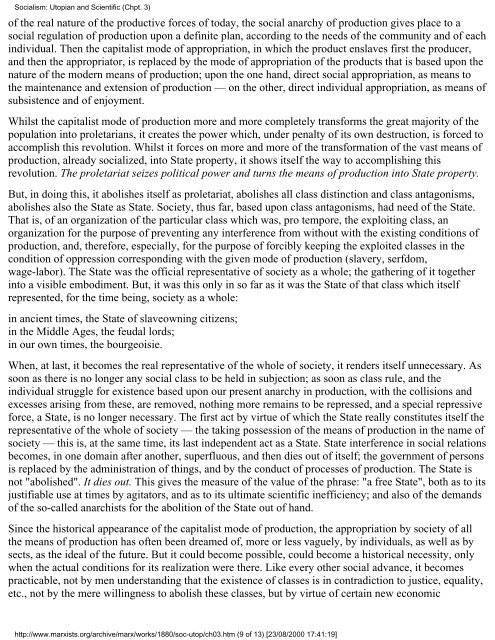Socialism: Utopian and Scientific - MIA
Socialism: Utopian and Scientific - MIA
Socialism: Utopian and Scientific - MIA
Create successful ePaper yourself
Turn your PDF publications into a flip-book with our unique Google optimized e-Paper software.
<strong>Socialism</strong>: <strong>Utopian</strong> <strong>and</strong> <strong>Scientific</strong> (Chpt. 3)of the real nature of the productive forces of today, the social anarchy of production gives place to asocial regulation of production upon a definite plan, according to the needs of the community <strong>and</strong> of eachindividual. Then the capitalist mode of appropriation, in which the product enslaves first the producer,<strong>and</strong> then the appropriator, is replaced by the mode of appropriation of the products that is based upon thenature of the modern means of production; upon the one h<strong>and</strong>, direct social appropriation, as means tothe maintenance <strong>and</strong> extension of production — on the other, direct individual appropriation, as means ofsubsistence <strong>and</strong> of enjoyment.Whilst the capitalist mode of production more <strong>and</strong> more completely transforms the great majority of thepopulation into proletarians, it creates the power which, under penalty of its own destruction, is forced toaccomplish this revolution. Whilst it forces on more <strong>and</strong> more of the transformation of the vast means ofproduction, already socialized, into State property, it shows itself the way to accomplishing thisrevolution. The proletariat seizes political power <strong>and</strong> turns the means of production into State property.But, in doing this, it abolishes itself as proletariat, abolishes all class distinction <strong>and</strong> class antagonisms,abolishes also the State as State. Society, thus far, based upon class antagonisms, had need of the State.That is, of an organization of the particular class which was, pro tempore, the exploiting class, anorganization for the purpose of preventing any interference from without with the existing conditions ofproduction, <strong>and</strong>, therefore, especially, for the purpose of forcibly keeping the exploited classes in thecondition of oppression corresponding with the given mode of production (slavery, serfdom,wage-labor). The State was the official representative of society as a whole; the gathering of it togetherinto a visible embodiment. But, it was this only in so far as it was the State of that class which itselfrepresented, for the time being, society as a whole:in ancient times, the State of slaveowning citizens;in the Middle Ages, the feudal lords;in our own times, the bourgeoisie.When, at last, it becomes the real representative of the whole of society, it renders itself unnecessary. Assoon as there is no longer any social class to be held in subjection; as soon as class rule, <strong>and</strong> theindividual struggle for existence based upon our present anarchy in production, with the collisions <strong>and</strong>excesses arising from these, are removed, nothing more remains to be repressed, <strong>and</strong> a special repressiveforce, a State, is no longer necessary. The first act by virtue of which the State really constitutes itself therepresentative of the whole of society — the taking possession of the means of production in the name ofsociety — this is, at the same time, its last independent act as a State. State interference in social relationsbecomes, in one domain after another, superfluous, <strong>and</strong> then dies out of itself; the government of personsis replaced by the administration of things, <strong>and</strong> by the conduct of processes of production. The State isnot "abolished". It dies out. This gives the measure of the value of the phrase: "a free State", both as to itsjustifiable use at times by agitators, <strong>and</strong> as to its ultimate scientific inefficiency; <strong>and</strong> also of the dem<strong>and</strong>sof the so-called anarchists for the abolition of the State out of h<strong>and</strong>.Since the historical appearance of the capitalist mode of production, the appropriation by society of allthe means of production has often been dreamed of, more or less vaguely, by individuals, as well as bysects, as the ideal of the future. But it could become possible, could become a historical necessity, onlywhen the actual conditions for its realization were there. Like every other social advance, it becomespracticable, not by men underst<strong>and</strong>ing that the existence of classes is in contradiction to justice, equality,etc., not by the mere willingness to abolish these classes, but by virtue of certain new economichttp://www.marxists.org/archive/marx/works/1880/soc-utop/ch03.htm (9 of 13) [23/08/2000 17:41:19]














![tyf Enf=O=n]lgg](https://img.yumpu.com/47584932/1/190x245/tyf-enfonlgg.jpg?quality=85)

